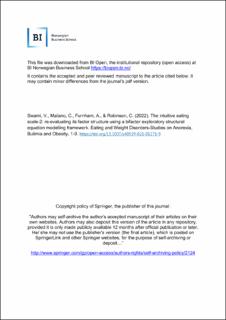| dc.contributor.author | Batey, M | |
| dc.contributor.author | Hughes, DJ | |
| dc.contributor.author | Mosley, A | |
| dc.contributor.author | Owens, CE | |
| dc.contributor.author | Furnham, Adrian | |
| dc.date.accessioned | 2023-09-28T12:13:35Z | |
| dc.date.available | 2023-09-28T12:13:35Z | |
| dc.date.created | 2022-07-18T16:22:22Z | |
| dc.date.issued | 2022 | |
| dc.identifier.citation | Personality and Individual Differences. 2022, 196 . | en_US |
| dc.identifier.issn | 0191-8869 | |
| dc.identifier.uri | https://hdl.handle.net/11250/3092738 | |
| dc.description.abstract | This study examined personality antecedents of idea generation when pursuing either benevolent or malevolent goals. Specifically, 308 participants completed two Divergent Thinking tests. A malevolent divergent thinking test (MDT) in which participants generated ideas to inflict revenge and a benevolent divergent thinking test (BDT) in which participants generated well-meaning ideas. In addition, participants provided self-ratings of their Openness-to-experience and Psychopathy. Drawing upon the Blind Variation Selective Retention Combinatorial model, we proposed a dual pathway model, in which Openness-to-experience was hypothesised to relate to BDT performance and psychopathy was hypothesised to relate to MDT performance. Structural Equation Models were consistent with hypotheses. Openness-to-experience was related to BDT but not MDT whereas Psychopathy was related MDT but not BDT. We also explored facet-level and aspect-level models, which revealed some interesting insights. In addition, we provide four key principles underlying the development of our MDT test that can serve as a guide for the construction of future tests. | en_US |
| dc.description.abstract | Psychopathy and Openness-to-experience as predictors of malevolent and benevolent creativity | en_US |
| dc.language.iso | eng | en_US |
| dc.publisher | Elsevier | en_US |
| dc.rights | Attribution-NonCommercial-NoDerivatives 4.0 Internasjonal | * |
| dc.rights.uri | http://creativecommons.org/licenses/by-nc-nd/4.0/deed.no | * |
| dc.subject | Creativity | en_US |
| dc.subject | Malevolent creativity | en_US |
| dc.subject | Divergent thinking | en_US |
| dc.subject | Personality | en_US |
| dc.subject | Psychopathy | en_US |
| dc.title | Psychopathy and Openness-to-experience as predictors of malevolent and benevolent creativity | en_US |
| dc.title.alternative | Psychopathy and Openness-to-experience as predictors of malevolent and benevolent creativity | en_US |
| dc.type | Peer reviewed | en_US |
| dc.type | Journal article | en_US |
| dc.description.version | acceptedVersion | en_US |
| dc.rights.holder | Elsevier | en_US |
| dc.source.pagenumber | 8 | en_US |
| dc.source.volume | 196 | en_US |
| dc.source.journal | Personality and Individual Differences | en_US |
| dc.identifier.doi | 10.1016/j.paid.2022.111715 | |
| dc.identifier.cristin | 2038690 | |
| cristin.ispublished | true | |
| cristin.fulltext | postprint | |
| cristin.qualitycode | 1 | |

